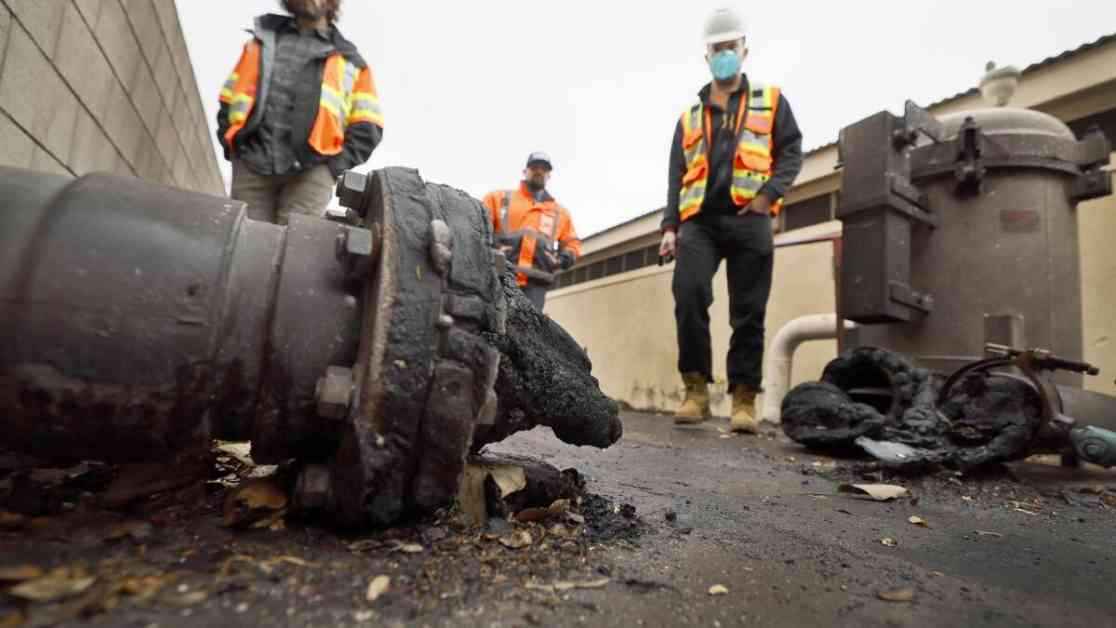Restoring Clean Drinking Water in Altadena and Pacific Palisades
The Rubio Cañon Land & Water Assn. in Altadena faced a daunting challenge on January 8 as they transformed their small office into a command post. While firefighters battled the Eaton fire above ground to save homes and lives, Rubio Cañon’s staff fought to preserve their below-ground water system. Unfortunately, it was a battle they were losing.
As one of the three private customer-owned water providers in Altadena, Rubio Cañon witnessed a significant loss of water from its system. Residents were using garden hoses to combat flames near their homes, resulting in water hemorrhaging from the underground pipes. The destruction of homes caused water lines to melt or break, leading to a drop in the water level and a vacuum forming in the system.
Today, many residents in Altadena and Pacific Palisades are still without clean drinking water, with advisories against drinking or boiling tap water still in place. Bottled water distribution has become a common sight, and despite technically being allowed to use tap water for certain purposes, many residents remain skeptical.
Restoration Efforts and Challenges
As residents question the delay in restoring clean drinking water, the utilities are navigating a complex process of rebuilding water pressure across their vast systems. This includes conducting numerous tests for hazardous substances and flushing the system until the water is deemed safe.
Jennifer Betancourt Torres, general manager of Lincoln Avenue Water Co., emphasized the scale of the operation and the need for patience from residents. Despite progress being made, the restoration process requires additional time due to the extensive damage caused by the wildfires.
Rubio Cañon, as a private company, faces additional hurdles in the restoration process. They must wait for environmental cleanup efforts to conclude before repairing critical infrastructure. The challenges don’t end there, with power outages, intermittent phone service, and the loss of digital mapping support adding to the complications.
The presence of benzene, a carcinogen found in gasoline and wildfire smoke, has been identified in water samples from various utilities. While efforts are underway to address this contamination, the process is time-consuming and requires thorough testing and mitigation measures.
Wildfire Impact on Water Systems
The aftermath of devastating wildfires poses unique challenges for water utilities. Restoring water pressure is the initial priority to prevent contaminants from entering the system. Workers must identify and seal thousands of potential leaks to ensure the system’s integrity and safety.
While the LADWP in the Palisades faced minimal infrastructure damage, Altadena’s utilities experienced critical losses. Rubio Cañon’s crew worked tirelessly to maintain the system amid the fire, while Lincoln Avenue witnessed the destruction of a significant reservoir.
The debate over wildfire contaminants continues within the scientific community, with a focus on volatile organic compounds (VOCs) like benzene. The risks associated with these chemicals underscore the importance of thorough testing and remediation efforts to ensure water safety.
Efforts to lift drinking advisories involve extensive flushing of the water system, followed by rigorous testing for contaminants. The process may require innovative techniques or infrastructure upgrades to eliminate hazardous substances and restore water quality.
As Altadena’s water utilities face financial strain and operational challenges, mutual aid from other agencies and community support play a crucial role in the restoration efforts. Despite the hardships, the dedicated teams at these small utilities remain committed to serving their communities and overcoming obstacles.
The road to restoring clean drinking water in Altadena and Pacific Palisades is a complex journey marked by resilience, collaboration, and unwavering dedication. Amidst the devastation of the wildfires, these communities are coming together to rebuild and ensure a sustainable future for all residents.


